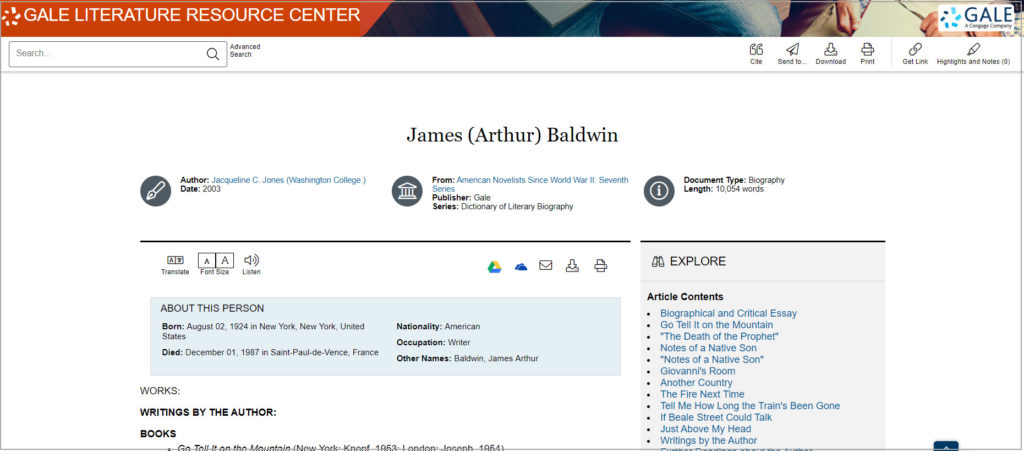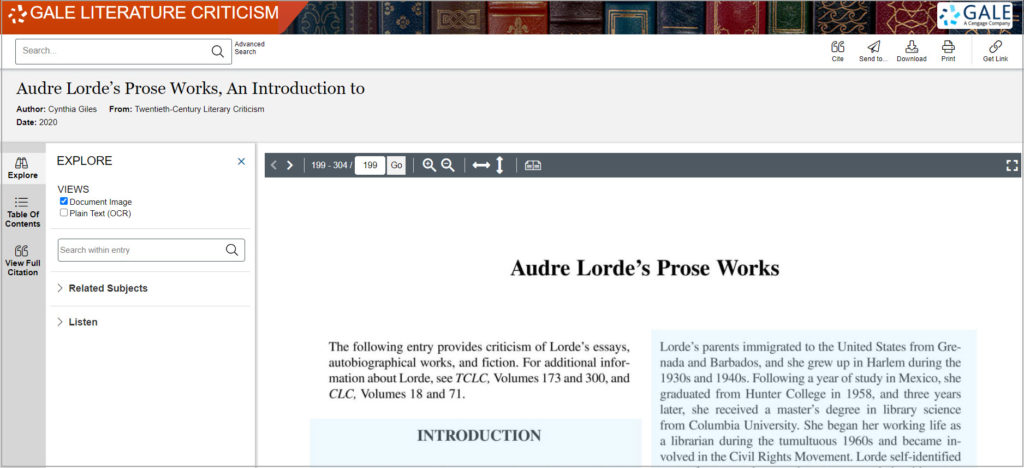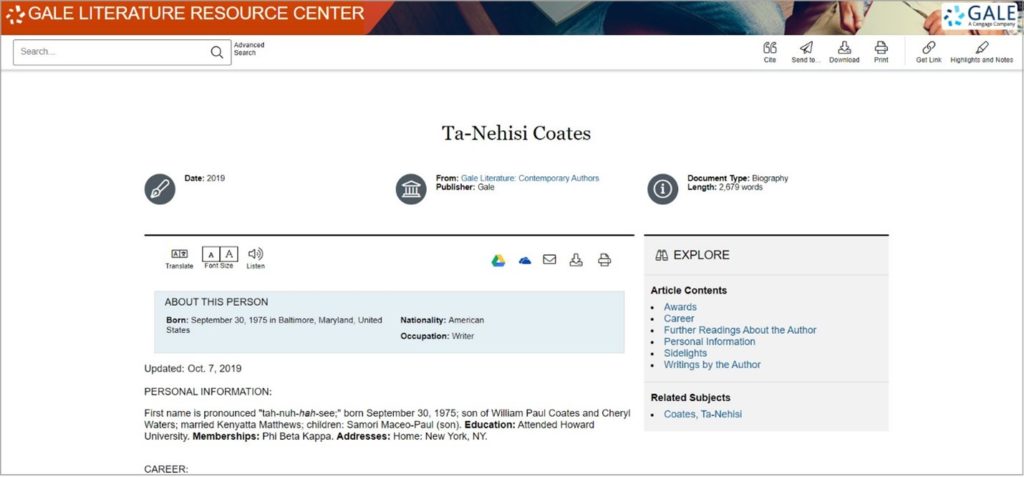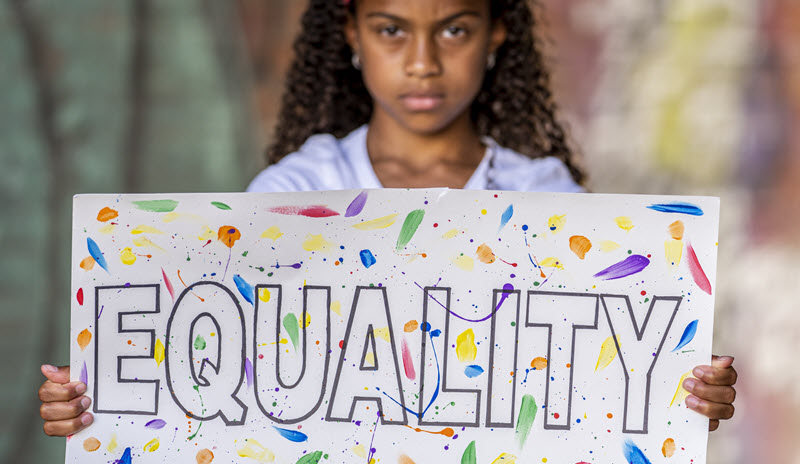| By Scot Peacock, Content Strategist, Gale |
The year 2020 will not be long forgotten. It is the year of the life-changing (and life-ending) COVID-19 pandemic; of heightened controversies involving police brutality and racial prejudice; and of the most crucial presidential election in 100 years, in terms of the future of a socially divided America.
The Black Lives Matter (BLM) movement—which originated in 2013 from the outrage surrounding the acquittal of George Zimmerman, the killer of 17-year-old Trayvon Martin—has voiced a strong, persistent message throughout the numerous instances of violence against unarmed African Americans. In the mission statement of the BLM movement is the goal “to eradicate white supremacy and build local power to intervene in violence inflicted on Black communities by the state and vigilantes.” The views of the BLM movement are stark; in their own words, “We are working for a world where Black lives are no longer systematically targeted for demise.”
Underlying the BLM movement is an affirmation of African American humanities and culture. Racial prejudice in America is as old as American history; and all along the way, there have been writers like William Wells Brown and Frederick Douglass pushing back against the weight of white power. In a 1965 debate about the concept of the American Dream between African American writer James Baldwin and conservative commentator William F. Buckley, Baldwin stated that progress in true racial equality can’t be achieved until all of us understand the many ways, large and small, that we are taught to devalue people who are unlike us—the same basic message being carried forward by the BLM movement.

A prominent poet of the Black Arts movement of the 1960s and 1970s, Audre Lorde confronted racism, sexism, and homophobia in her writings. Her 2017 collection of essays, speeches, and poems titled Your Silence Will Not Protect You, published posthumously, is timely reading for proponents of the BLM movement. The 1987 novel Beloved by Nobel prize-winning author Toni Morrison remains highly relevant as well, depicting the horrors of slavery and cycles of tragedy inflicted on African Americans following the Civil War. Other novels that resonate with the BLM movement include Sing, Unburied, Sing (2017) by Jesmyn Ward and The Hate U Give (2017) by Angie Thomas.

In the realm of nonfiction, Between the World and Me (2015) by Ta-Nehisi Coates is presented as a letter from Coates to his son, explaining how racist violence has been (and still is) deeply embedded within American society and institutions. So You Want to Talk about Race (2018) by Ijeoma Oluo identifies critical questions that come up during discussions of race and provides advice for a more fruitful dialogue. Also proposing a path forward is Ibram X. Kendi’s How to Be an Antiracist (2019), which suggests tactics for anti-racist actions on both individual and institutional levels.

Entries on the lives and works of the writers featured above, as well as many more who have been instrumental in bringing the fight for racial equality to literature, can be found in Gale Literature Resource Center, Gale Literature Criticism, and Dictionary of Literary Biography (available on the Gale Literature Criticism platform).
Recommended Reading
James Baldwin
The novels of James Baldwin are covered at length in Dictionary of Literary Biography, Volume 278, available in Gale Literature Resource Center.
Additional entries about Baldwin and his views on racial equality can be found in Gale Literature Resource Center, including:
Twentieth-Century Literary Criticism, Volume 229
Gale Literature: Contemporary Authors
Audre Lorde
The prose works of Audre Lorde are covered at length in Twentieth-Century Literary Criticism, Volume 385, available in Gale Literature Criticism.
Additional entries about Lorde and her works can be found in Gale Literature Resource Center, including:
An examination of the poem “Hanging Fire,” in Poetry for Students, Volume 32
An examination of the poem “Coal,” in Poetry for Students, Volume 49
Toni Morrison
Beloved by Toni Morrison is examined at length in Contemporary Literary Criticism, Volume 87, available in Gale Literary Criticism.
Additional entries about Morrison and her works can be found in Gale Literature Resource Center, including:
Gale Literature: Contemporary Authors
Dictionary of Literary Biography, Volume 331
Jesmyn Ward
Sing, Unburied, Sing by Jesmyn Ward is examined at length in Contemporary Literary Criticism, Volume 439, available in Gale Literary Criticism.
A biography of Ward can be found in Gale Literature: Contemporary Authors, available in Gale Literature Resource Center.
Angie Thomas
The Hate U Give by Angie Thomas is examined at length in Novels for Students, Volume 59, available in Gale Literature Resource Center.
A biography of Thomas can be found in Gale Literature: Contemporary Authors, also available in Gale Literature Resource Center.
Ta-Nehisi Coates
A biography of Ta-Nehisi Coates can be found in Gale Literature: Contemporary Authors, available in Gale Literature Resource Center.
Ijeoma Oluo
A biography of Ijeoma Oluo can be found in Gale Literature: Contemporary Authors, available in Gale Literature Resource Center.
Ibram X. Kendi
A biography of Ibram X. Kendi can be found in Gale Literature: Contemporary Authors, available in Gale Literature Resource Center.


